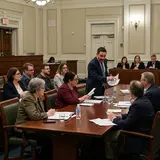Beyond Symbolic Inclusion: The Critical Role of Faculty Senate Presidents

There are many challenges when it comes to shared governance in higher education, and the evolving role of faculty senate presidents (FSPs) is among them. As administrative decision-making becomes increasingly centralized, faculty governance is losing influence. And the higher ed landscape is quite varied; while some university leaders seek faculty collaboration, others seem to intentionally exclude faculty voices from the decision-making process. FSPs have a critical role in shaping governance structures, namely through genuine faculty participation—rather than symbolic inclusion—that is essential for effective governance.
Both communication and trust are indispensable to strong institutional governance. Many FSPs feel disconnected from decision-making due to a lack of bidirectional communication with administrators. The solution to this is increased transparency and proactive information sharing. Beyond that, some faculty leaders report that administrators selectively share information with them in order to test faculty reactions, rather than genuinely incorporate their input.
We are indeed in a complex era in education, defined by overlapping crises, including financial instability and political interference. These challenges require a more collaborative and engaged approach to governance. Effective governance requires meaningful faculty involvement, which can only result from greater transparency and stronger collaboration between faculty and administrators, so that they can effectively navigate the increasingly complex landscape of higher education.
Researchers Jon McNaughtan, Esther A. Enright, Wu Xie, Meredith S. Billings, and Nathan F. Harris explore the nuances of these challenges in Teachers College Record, with their article, “Shared Governance in ‘Wicked’ Times: Perceptions of Faculty Senate Presidents on Faculty and Administrator Relationships.” Their study, which employed qualitative case study methods, included the interviewing of 13 FSPs from public four-year regional universities in order to analyze their perceptions of governance, administrative relationships, and structural challenges. You can find their full study linked below.
This erosion of faculty governance reflects broader societal trends of the centralization of power and the reassessment of hierarchies. The notion that administrators can unilaterally dictate educational policy undermines the expertise and vested interest of faculty in the academic mission. The symbolic inclusion of faculty is a deceptive tactic that masks the true diminishment of faculty authority. Genuine shared governance, rooted in respect for established roles, is vital for maintaining the integrity and quality of higher education, which is being lost to bureaucratic overreach. The decline in faculty influence signals a dangerous shift away from the time-honored principles of academic freedom and collegial decision-making.
For clarity, an FSP is normally elected. Their role is to lead the faculty senate, which advocates for faculty interests in university governance. An FSP’s responsibilities typically include facilitating communication between faculty and administration, voicing faculty concerns on institutional policies, and ensuring faculty participation in decision-making processes (in curriculum, academic standards, institutional governance, and so forth). An FSP also helps mediate conflicts, and works to uphold the principles of shared governance. The FSP plays a key role in maintaining transparency and collaboration between faculty and university leadership, especially in times of institutional change or crisis.
Many of us in education, even in the K-12 world, are deeply concerned about crises in higher education because they directly impact our students' futures. The quality and accessibility of higher education determine the opportunities available to graduating students. Declining standards and rising costs can limit students' potential, creating a ripple effect that weakens the entire educational pipeline. And then, the values and skills cultivated in higher education influence the broader society, shaping the world that our students will inherit. Therefore, the health of higher education is intrinsically tied to the success of all levels of education.
How can faculty governance ensure that faculty voices are genuinely considered rather than merely symbolic?